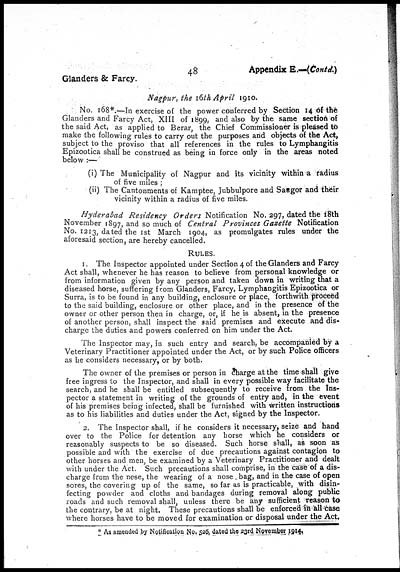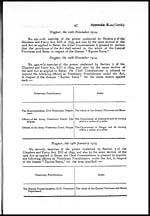Medicine - Veterinary > Civil Veterinary Departments > Manual of the Civil Veterinary Department, Central Provinces and Berar > Manual of the Civil Veterinary Department, Central Provinces
(56) Page 48
Download files
Individual page:
Thumbnail gallery: Grid view | List view

48 Appendix E.—(Contd.)
Glanders & Farcy.
Nagpur, the 16th April 1910.
No. 168*.—In exercise of the power conferred by Section 14 of the
Glanders and Farcy Act, XIII of 1899, and also by the same section of
the said Act, as applied to Berar, the Chief Commissioner is pleased to
make the following rules to carry out the purposes and objects of the Act,
subject to the proviso that all references in the rules to Lymphangitis
Epizootica shall be construed as being in force only in the areas noted
below :—
(i) The Municipality of Nagpur and its vicinity within a radius
of five miles ;
(ii) The Cantonments of Kamptee, Jubbulpore and Saugor and their
vicinity within a radius of five miles.
Hyderabad Residency Orders Notification No. 297, dated the 18th
November 1897, and so much of Central Provinces Gazette Notification
No. 1213, dated the 1st March 1904, as promulgates rules under the
aforesaid section, are hereby cancelled.
RULES.
1. The Inspector appointed under Section 4 of the Glanders and Farcy
Act shall, whenever he has reason to believe from personal knowledge or
from information given by any person and taken down in writing that a
diseased horse, suffering from Glanders, Farcy, Lymphangitis Epizootica or
Surra, is to be found in any building, enclosure or place, forthwith proceed
to the said building, enclosure or other place, and in the presence of the
owner or other person then in charge, or, if he is absent, in the presence
of another person, shall inspect the said premises and execute and dis-
charge the duties and powers conferred on him under the Act.
The Inspector may, in such entry and search, be accompanied by a
Veterinary Practitioner appointed under the Act, or by such Police officers
as he considers necessary, or by both.
The owner of the premises or person in charge at the time shall give
free ingress to the Inspector, and shall in every possible way facilitate the
search, and he shall be entitled subsequently to receive from the Ins-
pector a statement in writing of the grounds of entry and, in the event
of his premises being infected, shall be furnished with written instructions
as to his liabilities and duties under the Act, signed by the Inspector.
2. The Inspector shall, if he considers it necessary, seize and hand
over to the Police for detention any horse which he considers or
reasonably suspects to be so diseased. Such horse shall, as soon as
possible and with the exercise of due precautions against contagion to
other horses and men, be examined by a Veterinary Practitioner and dealt
with under the Act. Such precautions shall comprise, in the case of a dis-
charge from the nose, the wearing of a nose bag, and in the case of open
sores, the covering up of the same, so far as is practicable, with disin-
fecting powder and cloths and bandages during removal along public
roads and such removal shall, unless there be any sufficient reason to
the contrary, be at night. These precautions shall be enforced in all case
where horses have to be moved for examination or disposal under the Act.
* As amended by Notification No. 526 dated the 23rd November 1914.
Set display mode to: Large image | Zoom image | Transcription
Images and transcriptions on this page, including medium image downloads, may be used under the Creative Commons Attribution 4.0 International Licence unless otherwise stated. ![]()
| Permanent URL | https://digital.nls.uk/75692453 |
|---|




